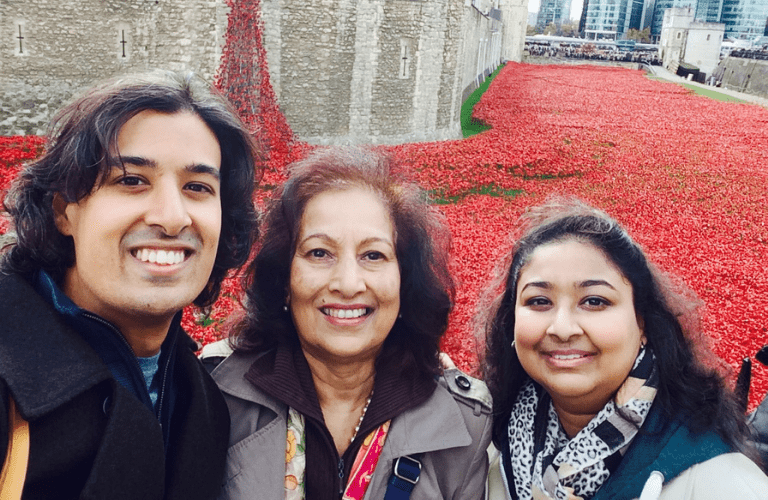
Book a virtual clinic appointment
Book a virtual clinic appointment with a dementia specialist Admiral Nurse at a time that works for you by video or telephone call.
Our new Closer to Home service, created in partnership with Leeds Building Society, has supported a record number of families affected by dementia.
Families from across the UK have been able to access specialist dementia care during the first year of a new project: Closer to Home.
Dementia UK launched its Closer to Home project in spring 2021 in partnership with Leeds Building Society to bring the charity’s specialist Admiral Nurses into more communities across the UK. Fundraising by the Society for the new service already has topped £400,000.
During its first year, the service has provided more than 1,700 families with a designated video or phone call with a dementia specialist Admiral Nurse, with local knowledge of services, at a time which suits them.
As dementia specialists, Admiral Nurses help families manage complex needs, considering the person living with dementia and the people around them. Their clinical, emotional and practical support enables people to live more positively with dementia.
Dementia UK is expanding its Admiral Nurses team to cope with increasing demand as the pandemic has led to a backlog in diagnosis of the condition.

Brother and sister Aqib and Shahbanu have benefited from the Closer to Home service
Through Closer to Home, Dementia UK already has provided support to 1,759 families living with dementia, with a target of delivering 2,400 appointments by end of March 2024.
Some of the top reasons for accessing the service include general information about dementia, symptoms and treatments, behaviour information, and advice on care options.
Admiral Nurses have been helping a growing number of families to live more positively with dementia by providing support around communication, behaviour changes, maintaining resilience, and getting a correct diagnosis.
A large proportion of service users – one in 15 – are accessing Closer to Home with suspected cases of dementia. With calls to reduce the diagnostic backlog increasing in intensity, Admiral Nurses on Closer to Home are advising people on steps they can take whilst they wait for a diagnosis. This can include advice on spotting the less-recognised symptoms of dementia, such as hallucinations and delusions in cases of Lewy body dementia. Symptom diaries can be a valuable way for families to keep track of a relative’s condition, and documenting these symptom changes as early as possible can help GPs with their diagnosis. It can also help GPs to recognise other more treatable conditions, like infections, which can be conflated with dementia.
Whilst Alzheimer’s disease and vascular dementia are still the top diagnoses which people are seeking support for, there are a number of other less recognised and understood subtypes which the charity’s Closer to Home specialist nurses are providing guidance on. Subtypes like frontotemporal dementia, which is most common in people who are 40-60, and Wernicke-Korsakoff syndrome (WKS) or other alcohol related dementia have both been recorded in the caseloads of Closer to Home Admiral Nurses.
The majority of service users to the Closer to Home service have been found to be children of parents with dementia, with people in the 51-60 bracket contacting the service most frequently.
Brother and sister Aqib and Shahbanu from Surrey have already benefited from the Closer to Home service. After accessing the service, Shahbanu said:
“My brother and I are very grateful to the virtual service provided by the Admiral Nurses. Following our mother’s very recent diagnosis, we have already taken great comfort in the knowledge that there is a group of dedicated, experienced, and knowledgeable nurses available. From just a single virtual call with Admiral Nurse Ruby, we found a sympathetic, and patient expert that carefully listened, empathised, counselled, and explained to us some of the basic issues about Alzheimer’s dementia and what to expect. The virtual service is a great innovation as the face-to-face component adds incredible value when talking about such sensitive issues. We very much hope to continue to access it to help us process what is happening to our mother and also be the best possible carers we can be.”
Paul Edwards, Director of Clinical Services, at Dementia UK said:
“Despite significant obstacles due to the pandemic, the Closer to Home service in partnership with Leeds Building Society has got off to a great start. When community services have been ravaged by Covid-19 and lack of funding, families have come to rely on alternative means of support. The Closer to Home service is a helping hand to families in need, which not only acknowledges the rising cases of dementia but taps into the greater need for flexibility. After all, many families need access to meaningful virtual and local support, in the face of caring responsibilities. We’re looking to see how we can evolve this service with our partners at Leeds Building Society and reach even more families affected by dementia up until 2024. Thanks to everyone at Leeds Building Society for their passion and commitment to support families with dementia.”
Richard Fearon, Chief Executive Officer at Leeds Building Society, thanked colleagues and members for their enthusiasm and generosity in backing the partnership with Dementia UK, which has already raised £400,000 for the charity.
“It’s fantastic to see the impact Closer to Home is having already to help more families across the UK to be able to live more positively with dementia. Dementia UK has developed creative responses to address challenges caused by the pandemic, such as virtual appointments when face to face clinics were impossible. We’re proud to have been able to help their wonderful Admiral Nurses reach more families in more communities across the UK.”

Book a virtual clinic appointment with a dementia specialist Admiral Nurse at a time that works for you by video or telephone call.
We are passionate about working with companies to make sure no family has to face dementia alone.